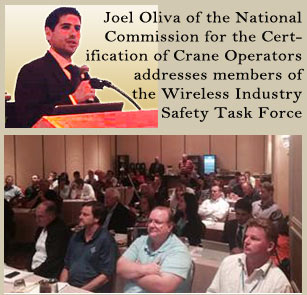Approximately 50 members of the Wireless Industry Safety Task Force, consisting of top safety and operations executives representing wireless carriers, tower owners, OEM’s, turnkey/construction management firms and NATE, met in Irving,  Tex. yesterday to discuss the continued progress of the National Wireless Skills-Based Training Standard
Tex. yesterday to discuss the continued progress of the National Wireless Skills-Based Training Standard
This premier skills-based worker standard is being created by the industry’s leading subject matter experts and has been a by-product of industry-wide collaboration.
Progress of the development of the National Wireless Safety Alliance (NWSA); the non-profit national assessment and certification organization that is being established, was also of key interest during the meeting.
The mission statement of the NWSA is to provide thorough, independent assessments of knowledge and skills and provide verifiable worker certification in order to enhance safety, reduce workplace risk, improve quality, encourage training, and recognize the skilled professionals who work on towers and other non-standard structures.
Other highlights of the meeting included updates from the task force’s Manufacturing and Engineering Solutions Working Group; a 2014 Industry Insurance Data report from Patrick Shea of Zurich/Tower Program Insurance Services; a discussion on OSHA’s Request for Information on Communication Tower Safety, and Wireless Estimator’s module that makes it easy to reply and review all comments; and a recap of OSHA’s 2015 National Safety Stand-Down.
“Today’s meeting provided a great platform to receive updates on the safety and quality initiatives that have originated from the work of the Wireless Industry Safety Task Force,” said NATE Executive Director Todd Schlekeway. “Due to the Task Force, every layer of the wireless infrastructure chain is collaborating in an effective and efficient manner and is in a strong position to solve the industry’s safety and quality challenges moving forward,” added Schlekeway.
















